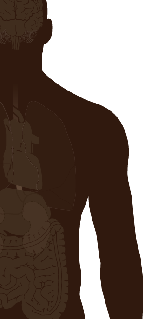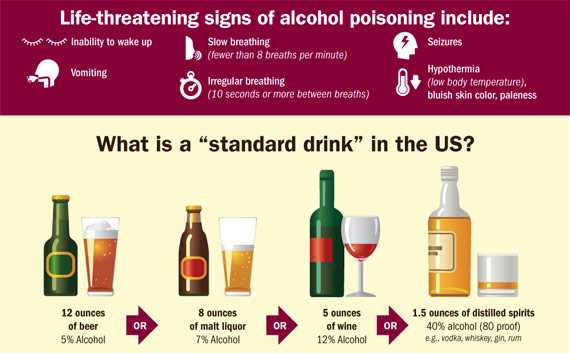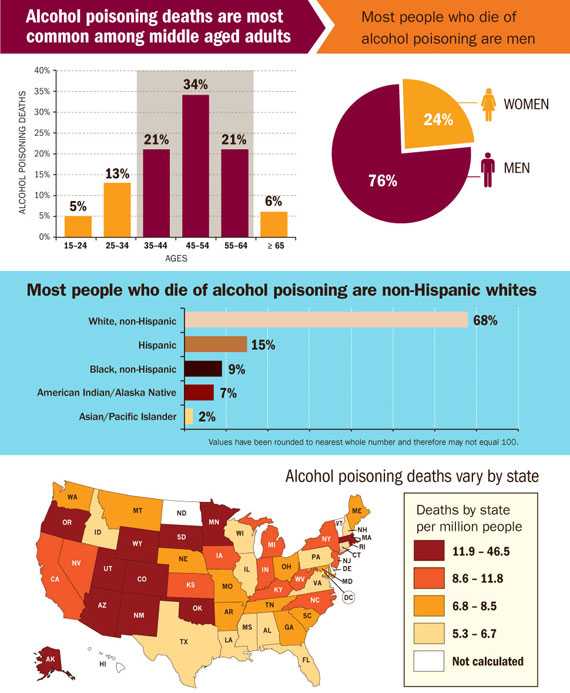Alcohol Poisoning Deaths
A deadly consequence of binge drinking

 6 a day
6 a day
An average of 6 people die of alcohol poisoning each day in the US.
 3 in 4
3 in 4
76% of alcohol poisoning deaths are among adults ages 35 to 64.
 76%
76%
About 76% of those who die from alcohol poisoning are men.
On average, 6 people died every day from alcohol poisoning in the US from 2010 to 2012. Alcohol poisoning is caused by drinking large quantities of alcohol in a short period of time. Very high levels of alcohol in the body can shutdown critical areas of the brain that control breathing, heart rate, and body temperature, resulting in death. Alcohol poisoning deaths affect people of all ages but are most common among middle-aged adults and men.
States and communities can take steps to reduce alcohol poisoning deaths by preventing binge drinking, including:
- Partnering with police, community groups, health departments, and doctors, nurses, and other health care providers to reduce binge drinking and related harms.
- Tracking the role of alcohol in injuries and deaths.
- Supporting proven programs and policies that decrease binge drinking. States with stronger alcohol policies have less binge drinking.
Problem
There are 2,200 alcohol poisoning deaths in the US each year.
Alcohol poisoning deaths:
- Most people who die are 35-64 years old.
- Most people who die are men.
- Most alcohol poisoning deaths are among non- Hispanic whites. Although a smaller share of the US population, American Indians/Alaska Natives have the most alcohol poisoning deaths per million people of any of the races.
- Alaska has the most alcohol poisoning deaths per million people, while Alabama has the least.
- Alcohol dependence (alcoholism) was identified as a factor in 30% of alcohol poisoning deaths.
Binge drinking can lead to death from alcohol poisoning.
- Binge drinking (4 or more drinks for women or 5 or more drinks for men in a short period of time) typically leads to a blood alcohol concentration (BAC) that exceeds 0.08 g/dL, the legal limit for driving in all states.
- US adults who binge drink consume an average of about 8 drinks per binge, which can result in even higher levels of alcohol in the body.
- The more you drink the greater your risk of death.
Infographic
What Can Be Done
The US government is
- Supporting proven programs and policies to reduce binge drinking.
- Helping states and communities measure binge drinking and related harms, including alcohol poisoning.
- Expanding access through the Affordable Care Act to new health insurance plans to cover alcohol screening and brief counseling.
We know what works
The Community Preventive Services Task Force has identified programs and policies to reduce binge drinking based on reviews of the scientific evidence: thecommunityguide.org/alcohol
States and communities can
- Support proven programs and policies that decrease binge drinking. States with stronger alcohol policies have less binge drinking.
- Partner with police, community groups, health departments, and doctors, nurses, and other health care providers to reduce binge drinking and related harms.
- Track the role of alcohol in injuries and deaths.
Doctors, nurses, and other providers can
- Screen all adult patients for binge drinking and counsel those who binge drink to drink less.
- Recognize that most people who drink too much are not alcohol dependent (alcoholics) but may still need counseling.
- Support proven programs and policies to prevent binge drinking.
Everyone can
- Avoid binge drinking. If you choose to drink alcohol, follow the dietary guidelines.
- Avoid drinks with unknown alcohol content or mixing alcohol with energy drinks. Caffeine can mask alcohol's effects and cause people to drink more than they intend.
- Get help for anyone experiencing lifethreatening signs of alcohol poisoning.
- Talk to your doctor, nurse, or other health care provider if you think you may have a drinking problem, or call the national Treatment Referral Routing Service (1-800-662-HELP).
2010 Dietary Guidelines for Americans:
- Don't start drinking or increase the amount you drink on the basis of potential health benefits. If you choose to drink, do so in moderation – up to 1 drink a day for women or up to 2 drinks a day for men.
- Don't drink at all if you are under age 21, pregnant or may be pregnant, have health problems that could be made worse by drinking, or are engaging in activities for which alcohol is dangerous (e.g., driving).
Science Behind the Issue
Related Pages
- Vital Signs Issue details: Alcohol Poisoning Deaths — United States, 2010–2012, Morbidity and Mortality Weekly Report (MMWR)
- Vital Signs – Alcohol Poisoning Deaths [PODCAST – 1:15 minutes]
- Vital Signs – Alcohol Poisoning Deaths [PSA – 0:60 seconds]
- Prevention Status Reports (PSRs): Excessive Alcohol Use
- Public Health Grand Rounds – Preventing Excessive Alcohol Use: What Public Health Can Do
- Binge drinking [VIDEO – 4:23 minutes]
- Alcohol and Public Health
- Preventing Excessive Alcohol Use
- Binge Drinking
- Caffeine and Alcohol
On Other Web Sites
- Page last reviewed: January 6, 2015
- Page last updated: January 6, 2015
- Content source:
Error processing SSI file


 ShareCompartir
ShareCompartir


